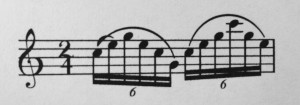Woodshedding: Grouping Game
- Marlene
- Blog, flute, Uncategorized
- 1 Comment
Woodshedding: Grouping Game
GROUPING GAME for your Woodshedding arsenal.
Woodshedding is the process of isolating a difficult section of music and practicing it until the technical issues are resolved. In other blog posts, I have offered games for changing articulations and rhythms. (See posts Rhythm Spinner Game, Articulation Game.) Today’s blog post will feature another strategy: changing how the notes are grouped. This changes where the accents are placed.
Think about your phone number for a moment. If you live in the US, your number is in the form 614-555-1212. We chunk the number into two sets of three digits and a final set of four numbers. Now, group your number differently. Let’s say 61-455-512-12. Or 6145-551-212. The order of the numbers did not change but our perception (and perhaps how easily they can be remembered) did change significantly.
Music is often grouped also. Here’s an example of four groups of three notes from a Handel Sonata:
In this example, there are 12 notes split by slurs into four groups of threes. By changing the groupings, we alter how the brain perceives the notes. The order and rhythm remain the same, but the accents are different. Try playing the same passage in groups of two, four, or six as shown below.
Groups of two:
Groups of four:
Groups of six:
In this exercise, we are playing the notes in the same order with the same rhythms. Two elements are changing:
- Different notes receive a small accent because they are the first of each grouping.
- The brain chunks them together in a new way.
Just as phone numbers are perceived differently when we changed the groupings of numbers, so too your brain is challenged when we change the groups of notes.




1 comment